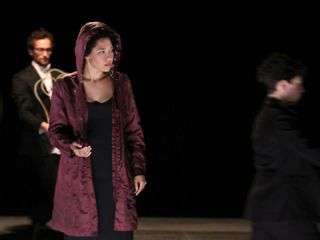|
Back
Dichterliebe Updated New York
Gerald Lynch Theater
09/29/2019 - & October 30* (New York), December 6, 7 (Lille), 2019
Robert Schumann & Bernard Foccroulle: Zauberland: An Encounter with Schumann’s “Dichterliebe”
Julia Bullock (Soprano), Cédric Tiberghein (Piano), with Ben Clifford, Natasha Kafka, David Rawlins, Raphael Zari
Katie Mitchell (Stage Direction), Chloe Lamford (Set and Costume Design), James Farncombe (Lighting Design)

S. Bullock (© Courtesy White Lights Festival, Lincoln Center)
Zauberland, is an updating of Robert Schumann’s gorgeous song cycle Dichterliebe, a tough act to follow. The Schumann cycle was originally written for the female voice, but has seldom been performed by women. Julia Bullock is one of our premier songstresses today. She was induced to sing the cycle when composer Bernard Foccroulle and Martin Crimp took on an update.
The cycle is composed of 16 songs. Originally there were twenty. Foccroulle and Crimp placed their additions where the subsequently deleted songs were at first placed. This is one justification for the updating. The other is to attract contemporary concert goers.
Anyone who has heard Bullock eagerly awaits the chance to hear her again. She sounded quite unlike the versions of herself we have heard before in John Adams and Henry Purcell. She is nothing if not daring, so it does that surprise that she took on the challenge of performing the classic work, updated to portray a Syrian female refugee. Bullock’s voice is glorious. She can reach anywhere and keeps her phrasing attuned to subtle emotional shifts. In the Schumann portion of the Zauberland she was delicate and nuanced, casting the suffering soul in a softer light than tenors and baritones do.
Bullock is also a superb actress. Constant wardrobe shifts did not deter her. Nor did the shifts from Schumann to Foccroulle. Foccroulle’s music grew out of Schumann’s quite naturally, a task which would seem insuperably difficult.
Yet the Syrian story was confusing and disjointed. What the music joined, the plot line did not. In a post concert discussion, the composer argued that something like Dichterliebe needed to be updated to be appreciated by today’s audiences. Works that don’t need updating and can stand tall today can be made attractive to an audience when performed by superlative artists like Bullock and the pianist, Cédric Tiberghien. Peter Brook’s cut of Carmen is a strong work. Multimedia additions to Arvo Pärt and Steve Reich by the artist Gerhard Richter have been delicious. Experimentation is well worth it. I wonder, however, why someone would chose to take a series of songs sung by a disserted and desperate lover, and insert the travails of a disoriented refugee.
Susan Hall
|